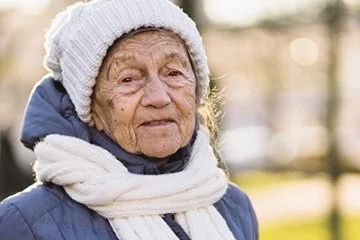

Preventing slips and falls for seniors
Older adults have the highest risk of falling and becoming seriously injured as a result of falling. The CDC reports that falls are the leading cause of injury and injury-related death in adults ages 65 and older.
More than one in four adults over 65 falls every year. According to the CDC, falling once doubles the risk of falling again. Falling can have serious consequences for older people. Approximately one of every five falls leads to injury. Every year, 800,000 people in the United States are hospitalized because of an injury from a fall. Most of these injuries are broken hips and head injuries.

Prostate Cancer Awareness Month: What Caregivers and Families Should Know
September is Prostate Cancer Awareness Month, a time dedicated to raising awareness about one of the most common cancers affecting men. For families and caregivers, this month is an important reminder to stay informed, offer support, and recognize the role early detection and quality care play in improving outcomes.

Signs Your Loved One May Need Extra Help at Home This Fall
As the fall season settles in, many families notice changes in their aging loved ones’ routines and well-being. The shorter days, cooler weather, and seasonal tasks can sometimes make it more obvious when someone may need additional support at home.
Recognizing the early signs can help you take action before small challenges become bigger concerns.

Heat Strokes in Seniors: What You Need to Know to Stay Safe This Summer
As temperatures rise during the summer months, heat-related illnesses like heat stroke become a serious risk — especially for older adults. Seniors are more vulnerable to heat stroke due to age-related changes in how the body regulates temperature, as well as underlying health conditions or medications that can affect hydration and heat tolerance.

Keeping Seniors Engaged and Entertained Indoors During the Hot Summer Months
When the temperatures climb outside, it’s often safest for older adults to stay indoors. But being cooped up inside doesn't have to mean boredom or isolation. With a little creativity and planning, the summer months can be just as engaging indoors as they are outdoors. Whether you're a caregiver, family member, or senior yourself, here are some fun, meaningful, and stimulating ways to stay active and entertained during the heat.

The Importance of Proper Nutrition for Seniors and How Home Care Helps in Brevard County, Florida
As we age, proper nutrition becomes more than just a healthy habit—it’s a vital part of maintaining strength, preventing illness, and improving quality of life. In Brevard County, Florida, where many retirees choose to enjoy their golden years, access to nutritious meals and consistent care can make all the difference. That’s where in-home senior care steps in as an invaluable support system.

Planning Ahead: How to Prepare for the Cost of Senior In‑Home Care in Brevard County, Florida
As seniors choose to age in place, in‑home care becomes a vital support system. In Brevard County, like the rest of Florida, hourly rates range from $25–$30, depending on qualifications and services needed. With thoughtful planning, families can prepare financially and ensure quality care long-term.

The Emotional Toll of Caregiving: How Family Caregivers Can Get Support
Caring for a senior loved one—whether a parent, spouse, or close relative—is one of the most compassionate roles a person can take on. But while caregiving can be rewarding, it can also take a serious emotional toll. Feelings of exhaustion, guilt, stress, and even resentment are common among family caregivers—and that’s okay.

The Best Home Modifications to Improve Senior Safety and Comfort Simple Changes That Make a Big Difference
As we grow older, the comfort of home becomes even more important—but so does the need for safety. For many seniors, a few thoughtful home modifications can make daily living easier, reduce the risk of accidents, and support independence for years to come. Whether you're planning for your own aging journey or helping a loved one, creating a senior-friendly home is a proactive and empowering step.

The Importance of Socialization for Seniors — And How Home Caregivers Can Help
As we age, staying socially connected becomes just as important as staying physically healthy. For many seniors, retirement, health challenges, or the loss of a spouse can lead to isolation—which can have a major impact on both mental and physical well-being. That’s where the power of socialization, and the support of a compassionate home caregiver, can make all the difference.

How to Talk to a Loved One About the Need for Home Care Help
Bringing up the topic of home care with a loved one can be one of the most emotional and delicate conversations you’ll ever have. Whether you're noticing signs of declining health, safety concerns, or increased forgetfulness, it can be hard for seniors to accept that they need help—and just as hard for you to know what to say.

Tips for Keeping Seniors Active and Engaged at Home: How Home Care Nurses Help Bring Joy and Movement into Daily Life
Staying active and engaged is essential for seniors' physical health, mental sharpness, and emotional well-being. When mobility slows down or social opportunities become limited, seniors may find themselves feeling isolated or unmotivated. That’s where thoughtful planning—and the support of a dedicated home care nurse—can make all the difference.

How Home Care Supports Seniors with Alzheimer’s and Dementia — and How Simple Activities Like Puzzles Can Help
Caring for a loved one with Alzheimer’s or dementia is a journey filled with both heart and hardship. As memory fades and everyday tasks become more challenging, it’s essential to provide compassionate, consistent care that supports both safety and quality of life. That’s where professional home care steps in—not just as a helping hand, but as a lifeline for both seniors and their families.

The Heart of Home Care: Understanding the Tasks and Duties of a Home Care Provider
Home care providers are more than just caregivers—they are trusted companions, helping hands, and essential support systems for seniors and individuals who wish to age in place with dignity and comfort. Whether assisting with physical needs or offering emotional support, home care providers play a vital role in enhancing quality of life every single day.

Signs That a Senior Needs More Help at Home — When It’s Time to Consider a Home Caregiver
As our loved ones age, it can be difficult to know when it’s time to step in with more support. While many seniors value their independence and prefer to stay in their own homes, there are often subtle (and not-so-subtle) signs that they need more help than they’re letting on. Recognizing these early can ensure their safety, comfort, and peace of mind. with an idea.
